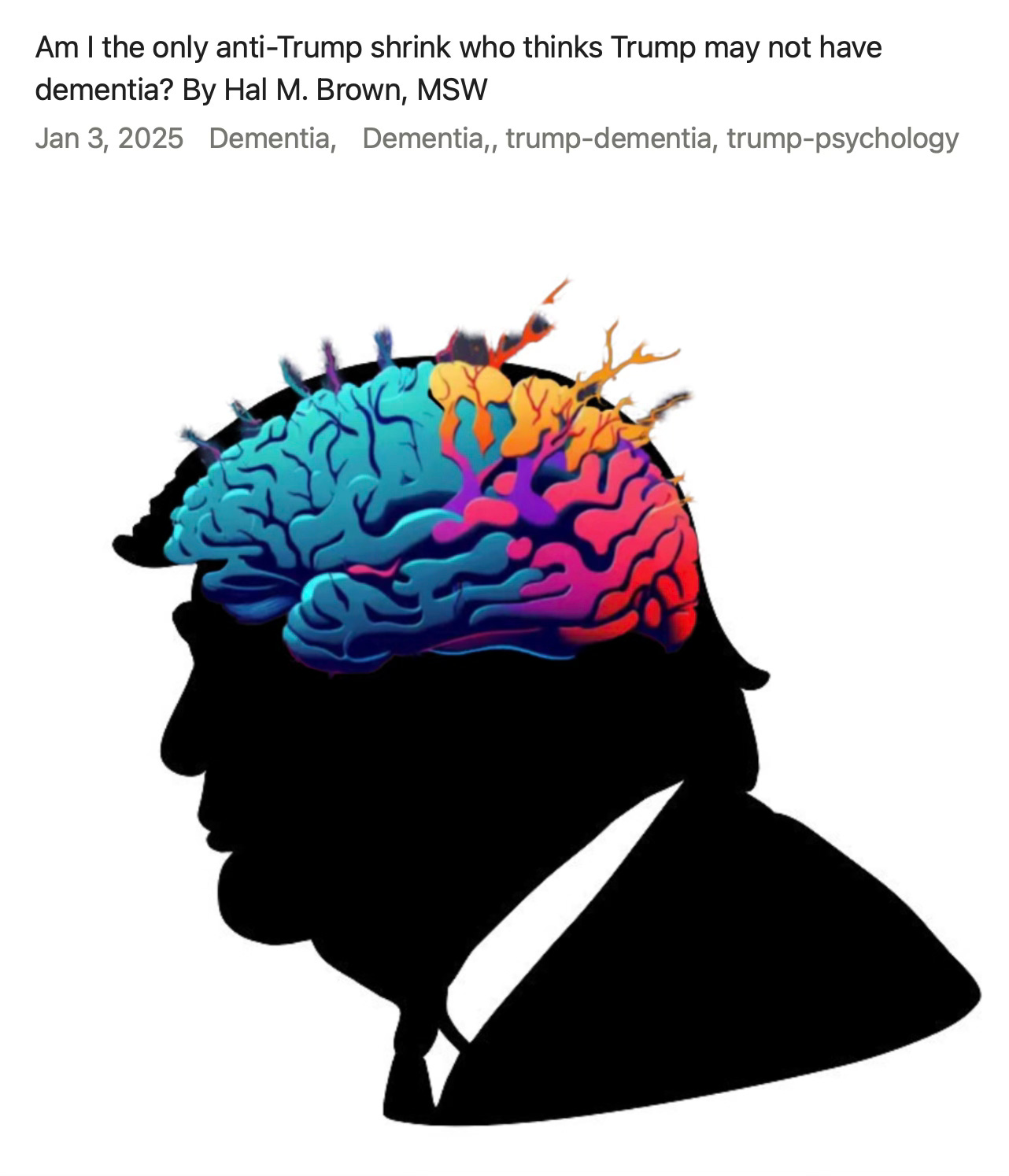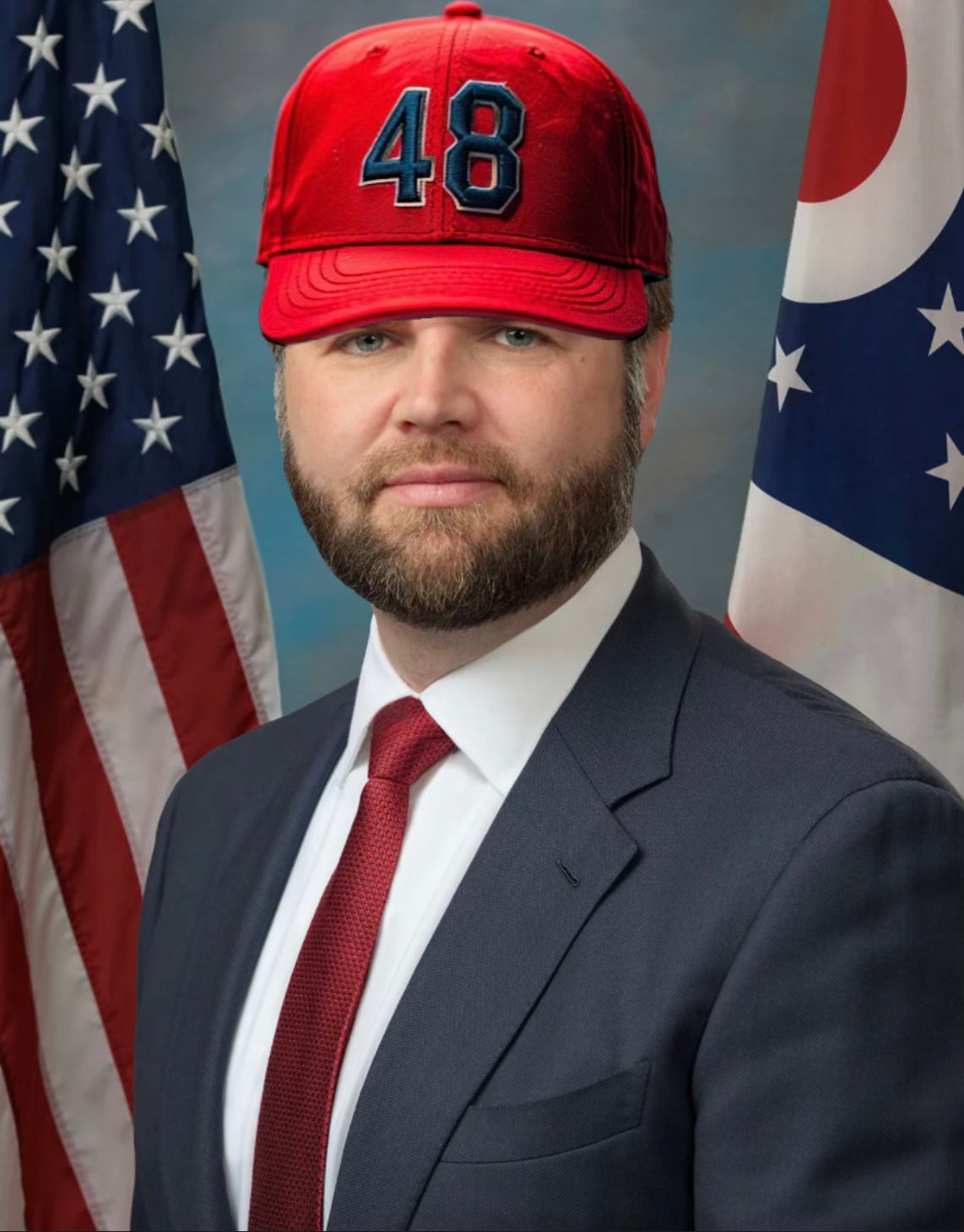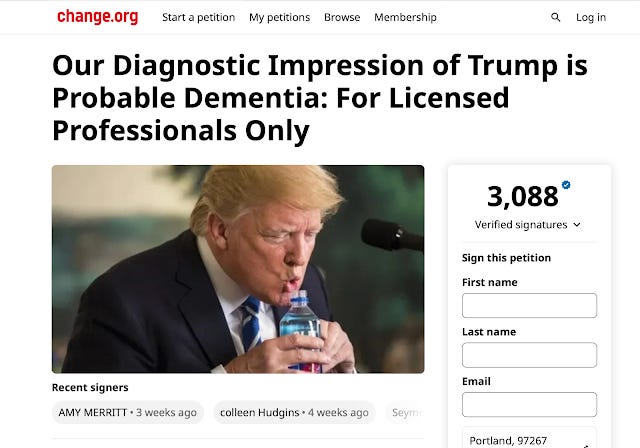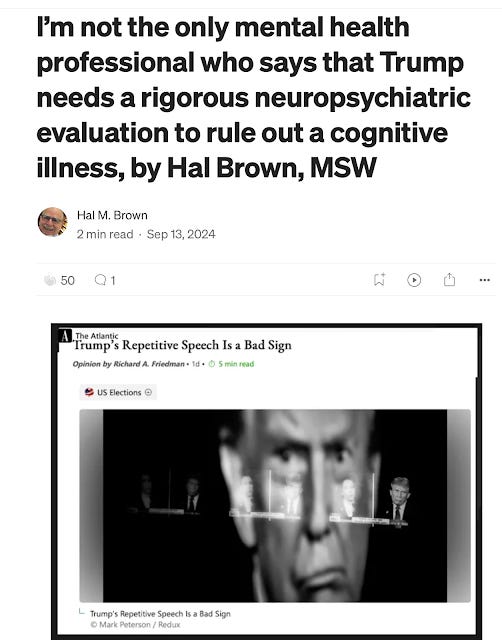Mary Trump (article above) thinks her uncle has dementia. She may be correct, but she’s not an expert.
Donald Trump stated that he had an MRI as part of a routine physical and described the results as “outstanding,” although he admitted he did not know what specific body part was analyzed during the scan. We don’t even know if he had a brain MRI. If he did, it should be noted that an MRI cannot directly diagnose dementia, but it can reveal brain changes associated with different types of dementia, such as brain atrophy or lesions. It is often used to rule out other conditions that may cause similar symptoms. Reference 1 / Reference 2
Let’s get one thing straight. Neither Mary Trump, a clincial psychologist who only did psychotherapy with patients in her one year internship, nor I, a clincial social worker who diagnosed and treated patients for 40 year, are qualified to diagnose dementia. Neither is Duty to Warn founder Dr. John Gartner who has seen numerous psychotherapy patients. He says Trump has dementia (see, Trump’s ‘cognitive decline’ putting U.S. at ‘grave risk’) and is often quoted.
The experts at diagnosing dementia are neurologists, neuropsychologists, and some gerontologists.
I asked Chat-GTP whether neurologists think. Trump has dementia and this is what I got:
Do Neurologists Think Trump Has Dementia?
Opinions among neurologists and mental health professionals regarding Donald Trump’s cognitive health and potential dementia vary significantly, often influenced by political perspectives.
Current Evaluations and Opinions
Cognitive Screening Results:
Donald Trump has publicly mentioned taking the Montreal Cognitive Assessment (MoCA), a test designed to assess cognitive function. He has claimed to have received perfect scores, suggesting normal cognitive abilities. However, experts point out that this test is not intended to measure intelligence or IQ.
Expert Opinions:
Some neurologists and psychologists express concerns about Trump’s mental fitness, citing observable behaviors. For example, neurologist Dr. John Gartner has explicitly stated that he believes Trump shows signs of dementia, including memory and behavioral decline, particularly in comparison to earlier years.
On the contrary, Trump’s physician reported comprehensive evaluations indicating no abnormalities in his cognitive or neurological functions during his annual physical.
Public Perception and Media Commentary:
Public discourse often reflects divisions in opinion. Supporters may interpret Trump’s cognitive assessments positively, while critics cite instances of strange behavior or speech as indicative of cognitive decline.
Comments from figures like Cornell University psychologist Harry Segal have suggested that erratic behavior can signal “accelerating cognitive decline.”
Dementia Assessments vs. IQ Tests:
The confusion surrounding cognitive tests often arises from Trump’s characterization of them as “IQ tests.” Experts clarify that assessments like the MoCA are specifically designed for identifying cognitive impairments associated with conditions like dementia, not for evaluating general intelligence.
Summary of Concerns
While official tests show that Trump performs well on cognitive assessments, many experts raise alarms about his behavioral signs that could suggest cognitive decline. These assessments lead to ongoing debates about his mental health, particularly in the context of his political career. Given the sensitive nature of cognitive health issues, the discussions are often politically charged, reflecting broader divisions in public opinion
Note that Dr. Gartner is referred to in this.
article where he’s called a specialist.
Dr. John Gartner, a specialist in the field, has observed that Trump, now 79, appears to be slowing down, with potential impairment in his motor skills. This observation follows sightings of Trump allegedly wearing a catheter under his right pant leg, which Gartner suggests could indicate the president is suffering from a specific type of dementia known as frontotemporal dementia.
Unfortunately, as far as I can tell the actual experts in dementia who have come out to suggest there are signs Trump has dementia are few and none have become prominent. One whose name was not familiar to me until I began to research this Substack is Dr. Narinder Kapur, a consultant neuropsychologist and visiting professor at the University College London. He said that “the president’s behavior over the last six months has been ‘quite odd and strange,’ as reported by Express, UK. (Reference) In this article once again John Gartner is referred to as follows:
Psychologist Dr. John Gartner, formerly of Johns Hopkins University, has tracked what he describes as a “major deterioration” in Trump’s language skills, motor skills, and impulse control. “If you go back and look at film from the 1980s, [Trump] actually was extremely articulate… now he really has trouble completing a thought and that is a huge deterioration,” Gartner told The Guardian.
What we basically have is a number of mental health professionals from the neice of Donald Trump to well known names like John Gartner, with a smattering of actual experts in dementia, weighing in with speculation that Trump has dementia. So has psychologist Harry Segal (here) and here. This is based on their observations of behavior that is often seen in people with early dementia.
Mary Trump has an edge because she can compare his behavior to his father’s.
Nobody is able to put a percentage on the likelihood he has any kind of dementia. This much is certain:
Trump claimed a quick test called the MOCA proves he has no cogntive impairment. This test cannot diagnose dementia with any degree of certainty. It can suggest someone might, but even passing it doesn’t prove they don’t. It also should be noted that if someone is so inclined they can take sample tests online. It’s possible someone close to Trump knew he’d be given this test and made sure he practiced taking it.
Trump says he passed his MRI with flying colors. A brain MRI cannot rule dementia in or out.
Neurologists, especially those who specialize in treating dementia patients, neuropsychologists who are also qualified, and many gerontologists, have had ample opportunity to observe Trump on television.
One expert to go public with an assessment of Trump’s possible cognitive impairment is neuroscientist Bobby Azarian. He explained how Trump and Biden’s cognitive impairments were different here. (See his website.)
He wrote:
As a neuroscientist myself, the question I’m mulling is whether Trump’s suspected brain damage is only in the area associated with speech production, known as Broca’s area, or also in the region associated with language comprehension, known as Wernicke’s area. The kind of paraphasia Trump is demonstrating, which does not involve a nonsensical pattern of words, is more likely to be a problem related to speech production, which is a less serious cognitive impairment.
The Trump-related gaffes that are much more concerning to me involve Trump confusing one person for another, in a way that is not just the result of a name slip, but an actual confusion of one person for another.
Even if a hundred of them issued a statement that urged that, based on what they have been seeing of him, they urge in the strongest possible terms that he undergo a complete assessment for dementia, it wouldn’t make any difference.
Here’s a Chat-gpt4 description of what this would entail:
Complete Dementia Assessment Components
A complete dementia assessment typically involves a comprehensive evaluations to determine cognitive function, behavioral changes, and other health issues. This process often includes several key components:
1. Medical History Review
Patient History: Gathering information about cognitive decline, memory loss, and any other symptoms.
Family History: Investigating any family history of dementia or neurological disorders.
Current Medications: Reviewing all medications to identify any that may affect cognition.
2. Physical Examination
Neurological Exam: Assessing reflexes, coordination, sensory perception, and motor skills.
Vital Signs: Measuring blood pressure, heart rate, and other essential health metrics.
3. Cognitive Assessments
Standardized Tests: Using tools like the Mini-Mental State Examination (MMSE) or the Montreal Cognitive Assessment (MoCA) to evaluate memory, attention, and problem-solving abilities.
Functional Assessments: Evaluating the ability to perform daily activities, which can provide insight into the extent of cognitive impairment.
4. Neuropsychological Testing
This may include a more in-depth analysis of cognitive functions such as memory, language, and executive functioning, often conducted by a neuropsychologist.
5. Laboratory Tests
Blood Tests: To rule out other causes of cognitive impairment (e.g., vitamin deficiencies, thyroid issues, infections).
Imaging Studies: CT or MRI scans may be used to identify structural changes in the brain, such as atrophy associated with dementia.
6. Psychiatric Evaluation
Assessment for Mood Disorders: Evaluating for depression or anxiety, which can coexist with dementia and complicate the diagnosis.
7. Caregiver and Family Input
Gathering insights from family members or caregivers about changes in behavior or cognitive decline over time.
I wrote the following in January:
The crucial words are “may not have.” What has chnaged since then is that I see ore behavioral indications he may have dementia that I did in January. However, I continue to want to be tentative and not go out on a limb and say he probably has this tragic disease. If he does as I worte previously, time will tell since the disease always gets worse.
As long as there are other explanations for his behavior some consider indications of dementia like stress or even a manic psychosis all we can do is wait and see.



























